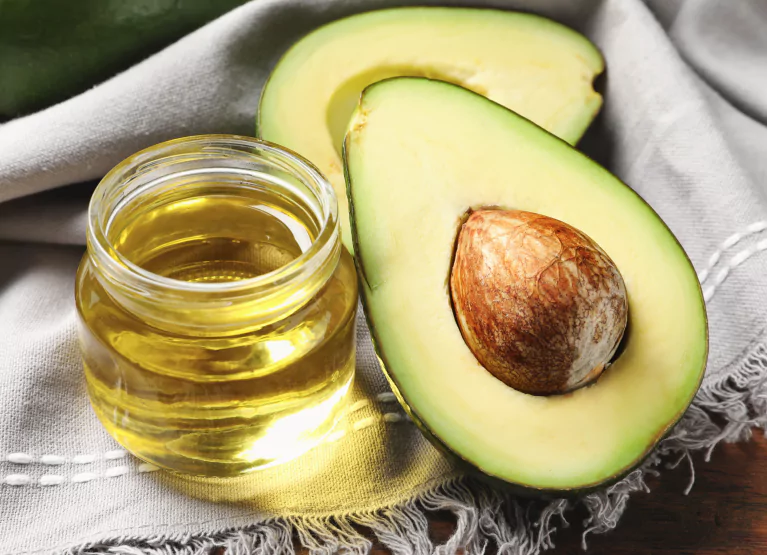5 Healthiest Cooking Oils to Use at Home
.webp)
Key Takeaways
If you cook at home regularly, you probably use a fair amount of cooking oil. Whether you’re adding it as a finishing touch to add flavor, using it to conduct heat and cook your food, or creating an emulsion for a mayonnaise or salad dressing, there are a number of uses for oil in cooking.
However, some oils don’t have the best reputation when it comes to your health. So, what is it that makes a cooking oil healthy or unhealthy? There are a number of factors that come into play here, including fat content and type, how it’s produced, and where the oil comes from.
Read on to learn more about what makes a cooking oil healthy, and which oils you may want to limit in your diet.
What Makes a Good Cooking Oil

So, what makes one cooking oil healthy or “better for you” over another? Let’s explore a few of the factors that can contribute to an oil’s health benefits.
Doesn’t Contain Trans Fats
A good rule of thumb when searching for a healthy cooking oil is opting for something that contains monounsaturated fats, rather than trans fats. A diet high in these types of fats may lead to elevated cholesterol levels and can put you at higher risk for heart disease.
Monounsaturated fats, on the other hand, have been associated with lower LDL cholesterol levels and a reduced risk of heart disease and stroke.
Omega-3 and Omega-6 Balance
Omega-3 fatty acids and omega-6 fatty acids are two types of polyunsaturated fats found in vegetable oils, nuts, seeds, and seafood. Your body does not produce these fatty acids, so you must get them from your diet.
Research shows that omega-3s have an anti-inflammatory effect in the body, and that eating a good balance of omega-3 fatty acids and omega-6 fatty acids may reduce inflammation.
However, the ratio of omega-6 to omega-3 is extremely important, as a diet high in omega-6 fatty acids but low in omega-3 fatty acids has been linked to increased inflammation. Studies show that the typical Western diet is deficient in omega-3s, and that the ratio of omega-6 to omega-3 consumption is about 16:1. This may be due to an increased consumption of vegetable oils.
Eating large amounts of processed cooking oils that are high in omega-6 fatty acids may contribute to inflammation, increase the risk of obesity, and is associated with coronary heart disease. Researchers generally recommend a ratio of 4:1 when it comes to omega-6 and omega-3 consumption to reduce the risk of health conditions like type 2 diabetes.
Method of Production

When looking at whether a cooking oil is healthy, you will also want to consider how it’s produced. Some oils are highly processed with chemicals like hexane and undergo a bleaching process in order to maintain a consistent color and texture. These may include sunflower oil, flaxseed oil, and canola oil.
Extra-virgin olive oil is an example of an oil that is unrefined and not treated with chemicals, which is what makes it a healthier choice, as we’ll discuss later on.
Smoke Point
Refined oils tend to have a higher smoke point, another factor to consider when choosing a healthy oil. When cooking oils are heated, they eventually begin to break down and start smoking. An oil’s smoke point is the temperature at which it begins to smoke.
A low smoke point does not necessarily mean an oil is unhealthy. But if an oil has a lower smoke point, you will want to avoid cooking it at a high temperature.
This is because harmful compounds called lipid oxidation products (LPOs) are created as oil breaks down and begins to smoke. These compounds can increase the risk of serious health problems, like cardiovascular disease.
At its smoke point, some oils can also release acrolein, which is found in food smoke and tobacco smoke. Acrolein can cause inflammation of your respiratory system, and in some cases may contribute to the development of asthma and cancer.
Best Cooking Oils to Use
With so many different types of oils on the market, it can be tough to know which ones to choose. However, it’s important to note that regardless of the type of oil you are consuming, you’ll want to do so in moderation.
Here are five cooking oils that can contribute to a healthy diet.
Olive Oil

Olive oil is extracted from the ripe fruit of the olive tree. Extra-virgin olive oil, which is a common feature of the Mediterranean diet, is especially healthy because it has only been pressed once, and has received no further treatment after its pressing.
This single pressing keeps the free fatty acids in extra virgin olive oil intact, which provide energy for the body. Olive oil is high in monounsaturated fats, with 9.8 grams per tablespoon. It has a smoke point of 325-275 degrees, which makes it suitable for cooking, although it’s not ideal for high-heat cooking such as deep frying.
Olive oil has many health benefits. Studies show that olive oil may have a positive effect on cardiovascular health in reducing risk for obesity and insulin resistance. It also has anti-inflammatory and antioxidant properties and may reduce the risk of breast and digestive tract cancers.
Olive oil has also been shown to aid in the prevention and management of type 2 diabetes. The health effects of olive oil are especially potent if it is not heated or cooked, so you may want to try using it as a finisher on your plate or add it into a salad dressing.
Coconut Oil
Coconut oil is extracted from the kernel of coconuts, which is the white meat found inside the shell. Coconut oil is sometimes labeled as controversial due to high saturated fat content: one tablespoon has 11 grams of saturated fat.
For this reason, it may be a good idea for some people to limit consumption of coconut oil to stay below 13 grams of saturated fat per day, as recommended by the American Heart Association.
The status of saturated fat and its impact on health is still debated. Deeper meta-analyses have suggested that all guidelines should consider the diverse foods containing saturated fats, which may possess harmful, neutral, or even beneficial effects in relation to major health outcomes. It's possible that scientists may make revisions to these current guidelines over time.
Coconut oil also has some notable health benefits. It contains antioxidants, which may reduce inflammation and the risk of degenerative diseases. Studies also suggest coconut oil may prevent secondary diabetes complications, which include nerve and organ damage.
Coconut oil has a smoke point of 350 degrees, making it suitable for cooking, though like olive oil, you may want to avoid using it in high-heat cooking like deep frying.
Avocado Oil

Avocado oil comes from the avocado fruit. It is high in monounsaturated fats, with 9.9 grams per tablespoon. It has a relatively high smoke point of 375-400 degrees, making it a good choice for high-heat cooking. Studies show that it maintains its nutritional quality at high temperatures.
Avocado oil may also reduce inflammation in joints, having a beneficial effect on osteoarthritis. Studies done in animals have found promising evidence to suggest that avocado oil may help lower blood pressure and reduce inflammation and cholesterol levels, all of which may have a positive impact on heart health. However, human studies are still needed to establish a definitive link.
Sesame Oil
Sesame oil is an oil made from sesame seeds and is a common ingredient in Asian cuisine. It is also available as toasted sesame oil, which is known for its deep, nutty flavor.
Sesame oil contains both polyunsaturated and monounsaturated fats. It has a smoke point of 350-410 degrees, making it another good choice for high-heat cooking.
Research also shows that sesame oil may mitigate some harmful effects of type 2 diabetes; improve blood sugar regulation; improve heart, liver, and kidney function; and lower oxidative stress. Sesaminol, an antioxidant found in sesame seeds, has neuroprotective effects and might play a role in preventing Parkinson’s disease.
Butter
Butter is made by churning cream and is fairly high in saturated fat, with 7.3 grams per tablespoon. While it seems that researchers have gone back and forth when it comes to butter’s health effects, a recent meta-analysis on butter determined that consuming butter in moderation did not appear to be linked to significant health effects.
Butter also contains a high amount of vitamin A, an essential nutrient that is important for vision, immune function, and growth and development. It’s also a good source of conjugated linoleic acids (CLA), which might reduce cholesterol levels, inhibit tumor growth, and promote a loss of body fat.
Cooking Oils to Limit in Your Diet

Unfortunately, not all cooking oils have health benefits. If you’re concerned about certain oils and how they may be affecting you, consider consulting a registered dietitian nutritionist to discuss your individual health needs.Here are some of the cooking oils you may want to limit or avoid.
Peanut Oil

Peanut oil is an oil made from pressing peanuts. It has 6.2 grams of monounsaturated fat and 4.3 grams of polyunsaturated fat per tablespoon. Peanut oil is a popular choice for deep frying and high heat cooking because it has a high smoke point of 450 degrees.
However, as with other oils on this list, peanut oil contains a high amount of omega-6 fatty acids, which are thought to increase inflammation and the risk of obesity. For this reason, you may want to use peanut oil sparingly.
Animal studies have also found that peanut oil may help reduce blood sugar and improve cholesterol in rats with diabetes. While these results may be promising, long-term human studies are still needed to establish a link.
Walnut Oil and Flaxseed Oil
While walnut oil does contain beneficial omega-3 fatty acids, it also has a significantly low smoke point and may produce harmful free radicals when cooked which can contribute to inflammation and oxidative stress down the road.
Similar to walnut oil, flaxseed oil contains beneficial omega-3 fatty acids but is prone to producing free radicals when cooked, so it should only be used in cold dishes such as salad dressings.
Seed Oils
There are a number of different types of oil that fall under the umbrella of “seed oils.” Soybean, grapeseed, rapeseed, canola, sunflower, safflower, cottonseed, and rice bran oil are examples of seed oils. Although sesame oil is technically made from seeds, it is not usually included in this group.
Soybean Oil
Soybean oil, an oil made from the soybean plant, has been shown in multiple animal studies to cause negative metabolic changes, like obesity, higher blood sugar, and fatty liver. More animal research shows that soybean oil might negatively affect the hypothalamus, which might affect conditions like Alzheimer’s, anxiety, and depression.
In all these cases, human studies are needed to establish a definitive link. However, you may want to limit your consumption of soybean oil.
Canola or Vegetable Oil

Vegetable oil is a refined and highly processed oil that comes from a blend of plant and seed sources. Vegetable oil may contain trans fatty acids, which can significantly impact heart health.
In fact, research suggests that consumption of trans fats causes 30,000 premature deaths in the U.S. per year. Trans fats reduce HDL cholesterol levels and raise LDL cholesterol levels, which can greatly increase the risk of heart disease.
Canola oil is a type of vegetable oil, and is derived from the rapeseed plant. While canola oil contains a high amount of unsaturated fats and may be genetically modified to have higher monounsaturated fats, it is usually highly processed and refined, which removes many of its nutrients and may reduce its health value. Studies have shown that canola oil might also be associated with weight gain.
Animal studies have also shown that canola oil can raise cholesterol levels and may reduce antioxidants in the body. Further animal studies have shown that canola oil might have a negative effect on memory. Long-term human studies are needed to determine a link.
Sunflower Oil
Sunflower oil is high in monounsaturated fat and beneficial vitamin E, but it is also high in omega-6 fatty acids, which may be associated with inflammation.
Sunflower oil has also been shown to release toxic compounds called aldehydes when heated. Aldehydes can damage cells and DNA and post a significant health risk. For this reason, you may want to limit the amount of sunflower oil you cook with, or aim to use sunflower oil in low-heat preparations.
Hydrogenated Oils
Hydrogenated oils, sometimes labeled as “partially hydrogenated oil” contain higher trans fats compared to some other cooking oils. Partially hydrogenated oils such as palm oil are known for raising bad cholesterol (LDL) levels in the body and lowering good cholesterol (HDL), which may increase the risk of heart disease.
Margarine

Margarine is a butter replacement that was invented in France in 1869 when fat and oil were scarce. It was originally made with animal fat, but today is mostly made from vegetable oils like corn, cottonseed, safflower, soy, and sunflower oils.
Margarine in stick forms contains trans fats, which can raise cholesterol levels and the risk of heart disease. In general, the harder the margarine, the higher its trans fat content.
What to Know About Fish Oil
Both fish and algae oil are strictly used as dietary supplements to help you consume more DHA and EPA, which are highly active forms of omega 3 fatty acids. Fish oil is not suitable for cooking at high temperatures, as it has a low smoke point and can develop a fishy taste. It is better used as a supplement or added to already cooked dishes for flavor.
The Bottom Line on Cooking Oils
There are many factors to consider when it comes to healthy cooking oils, so here’s what to keep in mind.
- Limit or avoid oils that are high in polyunsaturated fats if you are cooking at high temperatures or frying foods to reduce oxidation.
- Limit or reduce your use of seed oils and margarine, especially if you are at risk for cardiovascular disease.
- Opt for high quality extra virgin olive oil, avocado oil (or whole avocados, better yet!), or coconut oil, which are low in polyunsaturated fats.
Find the right Nutrisense programto turn insight into progress.
Go Beyond Glucose Data with Nutrisense
Your glucose can significantly impact how your body feels and functions. That’s why stable levels are an important factor in supporting overall wellbeing. But viewing glucose isn't enough. Nutrisense, you’ll be able to learn how to use your body's data to make informed lifestyle choices that support healthy living.
One-to-one coaching
Sign up to access insurance-covered video calls to work with a glucose expert: a personal registered dietitian or certified nutritionist who will help tailor your lifestyle and diet to your goals.
Monitor and measure what matters
With the Nutrisense CGM Program, you can monitor your glucose with health tech like glucose biosensors and continuous glucose monitor (CGM)s, and analyze the trends over time with the Nutrisense App. This will help you make the most informed choices about the foods you consume and their impact on your health.
Find your best fit
Ready to take the first step? Start with our quiz to find the right Nutrisense program to help you take control.

Heather is a Registered and Licensed Dietitian Nutritionist (RDN, LDN), subject matter expert, and technical writer, with a master's degree in nutrition science from Bastyr University. She has a specialty in neuroendocrinology and has been working in the field of nutrition—including nutrition research, education, medical writing, and clinical integrative and functional nutrition—for over 15 years.




